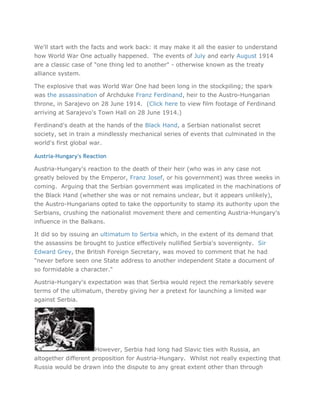
Bully
- 1. We'll start with the facts and work back: it may make it all the easier to understand how World War One actually happened. The events of July and early August 1914 are a classic case of "one thing led to another" - otherwise known as the treaty alliance system. The explosive that was World War One had been long in the stockpiling; the spark was the assassination of Archduke Franz Ferdinand, heir to the Austro-Hungarian throne, in Sarajevo on 28 June 1914. (Click here to view film footage of Ferdinand arriving at Sarajevo's Town Hall on 28 June 1914.) Ferdinand's death at the hands of the Black Hand, a Serbian nationalist secret society, set in train a mindlessly mechanical series of events that culminated in the world's first global war. Austria-Hungary's Reaction Austria-Hungary's reaction to the death of their heir (who was in any case not greatly beloved by the Emperor, Franz Josef, or his government) was three weeks in coming. Arguing that the Serbian government was implicated in the machinations of the Black Hand (whether she was or not remains unclear, but it appears unlikely), the Austro-Hungarians opted to take the opportunity to stamp its authority upon the Serbians, crushing the nationalist movement there and cementing Austria-Hungary's influence in the Balkans. It did so by issuing an ultimatum to Serbia which, in the extent of its demand that the assassins be brought to justice effectively nullified Serbia's sovereignty. Sir Edward Grey, the British Foreign Secretary, was moved to comment that he had "never before seen one State address to another independent State a document of so formidable a character." Austria-Hungary's expectation was that Serbia would reject the remarkably severe terms of the ultimatum, thereby giving her a pretext for launching a limited war against Serbia. However, Serbia had long had Slavic ties with Russia, an altogether different proposition for Austria-Hungary. Whilst not really expecting that Russia would be drawn into the dispute to any great extent other than through
- 2. words of diplomatic protest, the Austro-Hungarian government sought assurances from her ally, Germany, that she would come to her aid should the unthinkable happen and Russia declared war on Austria-Hungary. World War I (WWI) or the First World War, formerly called the Great War, was a major war centred on Europe that began in the summer of 1914 and lasted until November 1918. It involved all of the world's great powers,[4] assembled in two opposing alliances: the Allies (centred around the Triple Entente) and the Central Powers.[5] More than 70 million military personnel, including 60 million Europeans, were mobilised in one of the largest wars in history. [6][7] More than 9 million combatants were killed, largely because of great technological advances in firepower without corresponding advances in mobility. It was the second deadliest conflict in Western history.[8] The assassination on 28 June 1914 of Archduke Franz Ferdinand of Austria, the heir to the throne of Austria-Hungary, was the proximate trigger of the war. Long-term causes, such as imperialistic foreign policies of the great powers of Europe, such as the German Empire, the Austro-Hungarian Empire, the Ottoman Empire, the Russian Empire, the British Empire, France, and Italy, played a major role. Ferdinand's assassination by a Yugoslav nationalist resulted in a Habsburg ultimatum against the Kingdom of Serbia.[9][10] Several alliances formed over the past decades were invoked, so within weeks the major powers were at war; via their colonies, the conflict soon spread around the world. On 28 July, the conflict opened with the Austro-Hungarian invasion of Serbia,[11][12] followed by the German invasion of Belgium, Luxembourg and France; and a Russian attack against Germany. After the German march on Paris was brought to a halt, the Western Front settled into a static battle of attrition with a trench line that changed little until 1917. In the East, the Russian army successfully fought against the Austro-Hungarian forces but was forced back by the German army. Additional fronts opened after the Ottoman Empire joined the war in 1914, Italy and Bulgaria in 1915 and Romania in 1916. The Russian Empire collapsed in 1917, and Russia left the war after the October Revolution later that year. After a 1918 German offensive along the western front, United States forces entered the trenches and the Allies drove back the German armies in a series of successful offensives. Germany agreed to a cease-fire on 11 November 1918, later known as Armistice Day. By the war's end, four major imperial powers—the German, Russian, Austro- Hungarian and Ottoman Empires—had been militarily and politically defeated. The latter two ceased to exist.[13] The revolutionised Soviet Union emerged from the
- 3. Russian Empire, while the map of central Europe was completely redrawn into several smaller states.[14] The League of Nations was formed in the hope of preventing another such conflict. The European nationalism spawned by the war and the breakup of empires, and the repercussions of Germany's defeat and the Treaty of Versailles led to the beginning of World War II in 1939.[15]